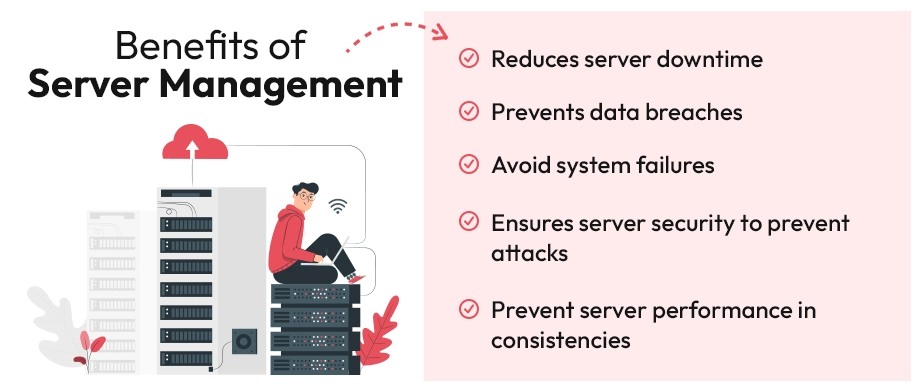
Server Management – Here’s Why That’s A Good Thing
Web Server Published on Date: February 15th 2022Bought a new web server to power your website? But what about its management? Wondering! Read our blog to know what is server management why it is crucial for your website.
Table of Contents
Whether you’re seeking an affordable solution to kickstart a small community server or aiming for a robust infrastructure to support a bustling virtual realm, these hosting providers have demonstrated their capabilities to cater to a diverse range of needs. From resource allocation and mod support to user-friendly interfaces and reliable customer assistance, the offerings presented by these top contenders hold the potential to redefine how you and your fellow players immerse yourselves in the pixelated landscapes of Minecraft.
What is Server Management?
Server management is the monitoring and upkeep of one or more servers to ensure optimal performance. It is observing and analyzing a web server to see how it performs and what more it needs for its enhanced performance. In a nutshell, it includes everything to ensure a server works optimally.
While server management means different to different server management companies, it is all about managing a server & its overall health. Maintaining a server isn’t easy. Monitoring server performance and its utilization takes much technical knowledge and time. Further, server management worsens when multiple servers are involved in operations.
While an established organization can still appoint an in-house IT team to manage its servers, this isn’t a viable option for small businesses or startups. Instead, outsourcing server management services to a reliable and reputed server management company seems far more promising. They will be responsible for monitoring the health of your server regularly and repairing or updating it regularly. This is, therefore, a great way to alleviate the headache of server management tasks that will come with your business growth.
Types of Servers
- Application Servers
- File Transfer Protocols (FTP) Server
- Database Servers
- Web Servers
- Proxy Servers
- Virtual Servers
Before we delve more into server management, it’s important that you know different types of servers. Why? When you know what your server type and functionalities are, you can ensure it is operating properly.
1. Application Servers – Such types of servers connect and run applications used by a multitude of users. With application servers, you don’t need to host your applications locally.
2. File Transfer Protocols (FTP) Server – Such servers are responsible for transferring data files between servers and devices.
3. Database Servers – DB servers store and make accessible large amounts of data for organizational functioning.
4. Web Servers – Simply collect and store website files & display sites in browsers.
5. Proxy Servers – Responsible for creating and maintaining connections between a client and external servers.
6. Virtual Servers – Commonly known as virtual machines (VM). These servers allow multiple servers to run on a single system. While managing these servers is difficult, admins can easily increase their efficiency by adding more computing power with less hardware.
So, what all comprises server management? The next section explains the same.
Components of Server Management
Although there are many different aspects of server management tasks, we have described its 4 major components.
- Continuous Monitoring
- Update Management
- Troubleshooting & Optimization
- Theft Identification & Risk Management
Let’s begin with knowing a little more about these terms:
1. Continuous Monitoring
To identify potential risks and threats before they become a headache, you must identify and resolve them in advance. For this, monitoring your server continuously is crucial. It involves reviewing access logs, monitoring servers, managing patch releases, etc. It also involves analyzing traffic spikes or identifying unauthorized login attempts and taking necessary measures to prevent them.
With monitoring, the server monitoring team can easily manage a network outage & take immediate actions so that it doesn’t affect the customers.
2. Update Management
Just like you need to update your websites or apps with new features & functionalities, you need to update your servers as well. Unfortunately, many organizations overlook or skip updating servers as it may take a lot of their time. But neglecting server updates gives an open invitation to hackers to access your confidential information, causing your business a great risk.
The Equifax data breach in which the personal data of about 143 million Americans was exposed to hackers, is a great example to learn from.
Since serve updates consist of important patches to security loopholes, these shouldn’t be ignored at all. Server updates also comprise new or enhanced features for better compatibility and functionality. Plus, these are also crucial for maintaining stability and eliminating outdated features.
3. Troubleshooting & Optimization
Resolving server issues is integral to its health and effective functioning. There are many server management tools out there that can detect and troubleshoot issues in a server. Server performance issues such as low available memory or CPU busy time can be easily detected using these tools. Accordingly, necessary actions can be taken even before the issue occurs.
4. Theft Identification & Risk Management
Cybersecurity is the biggest threat to the current internet landscape. With the advancement of technology, hackers have become more sharp-eyed to locate & attack vulnerable servers. Continuous monitoring of server access logs, security audits, regular updates of antivirus, and ethical hacking processes can help in safeguarding a server from the bad guys.
Server Management Activities
The server management service process involves various tasks. Some of the most common activities are discussed below.
- Provisioning/Setting Up Servers
- Configuring Servers
- Monitoring Servers
- Server Performance
- Implementing and Improving Security
- Backing Up and Restoring Servers
Let’s take a closer look at these activities:
1. Provisioning/Setting Up Servers
The first thing you do when you get a server is server provisioning wherein you set up your server. It typically involves tasks like getting the hardware, installing server management software, adding the server to the network & providing server access. Note here that these activities may differ depending upon whether the server is an on-premise or cloud server.
2. Configuring Servers
In this stage, your server is configured according to your use case. The server is on default settings when you first set it up. Once you’re done with configuring your server, you can use it to function as required.
3. Monitoring Servers
As already discussed in our previous section, server monitoring involves keeping a track of all your server activities. In this stage, you monitor your server’s health, failures, and performance & check for potential risks, if any. Monitoring is vital as it helps you determine issues & room for improvement. There are many server monitoring tools that automate and ease all these tasks. You just need to set them up and begin monitoring.
4. Server Performance
An underperforming server is a waste of resources. Hence, you should improve your server performance to its full potential. It comprises tasks like identifying server performance issues and finding an apt solution to them. Once you have identified the cause and found a solution to it, you will need to incorporate them to improve your server’s performance. Note that performance issues can be determined by monitoring various server performance metrics.
5. Implementing and Improving Security
An unsecured server can make your entire network and applications go down in seconds. While most types of web hosting providers offer security features as part of their package, you can always opt for more. However, this is won’t be the same if you have an on-premise server; your server security is entirely your responsibility. Besides the default security features that you get with your server and server operating system (OS), you should also use specialized hardware or software to bolster server security.
6. Backing Up and Restoring Servers
No matter how vigilant or cautious you are, things can still go wrong in a network. That is why backup and restoration are important server management activities. Having replicas of servers capable of handling traffic when one or more servers fail may be beneficial. However, frequent backups are more important, specifically if there’s a single point of server failure. So you can still recover data if things go wrong by restoring server states.
Why Should You Consider Server Management Seriously?
How would you feel if your entire customer data is wiped out & you don’t have any backup? What would happen if the front door of your shop is closed while your customers are waiting to buy from you? As a company or store owner, you will feel highly disappointed with the services being offered & your business reputation & growth will suffer. And your customers will switch to your competitors and never come back.
The same can happen if you don’t manage your server & look after it!
According to the U.S. Ecommerce Retail Revenue Forecast, 2017 to 2025 by Statista, the revenue that was around 768 billion U.S. dollars in 2021 is expected to exceed 1.3 trillion dollars by 2025. This rising trend in online shopping shows that customers are increasingly inclined towards e-commerce websites. As such, ill-function websites that either load slow or perform inefficiently won’t survive for long losing the interest of their customers. This makes server management tasks critical to the success of businesses.
Since your server powers your website and consequently your business, you should take all measures to manage it & ensure that it is functioning properly. Server management is a way to streamline your server-related tasks.
Benefits of Server Management:
- Reduces server downtime
- Prevents data breaches
- Avoid system failures
- Ensures server security to prevent attacks
- Prevent server performance in consistencies
- Proper management reduces server downtime & prevents data breaches. Plus, you can avoid system failures, which otherwise can affect your business operations.
- An unmanaged server is at a higher risk of attacks. Hackers and intruders can bypass authentication in order to gain access to your server or data. They can then either change your confidential data or even wipe it out altogether.
- If you fail to administer your server properly, it can affect your business. You could lose your brand reputation, potential consumers, and ultimately revenue.
- If you do not manage your server regularly, it can lead to unstable server environments.
Should You Outsource Your Server Management Needs?
Managing servers is a complex job. Besides having the technical knowledge to look into the ins and outs of server management, you need to invest a lot of time and effort. As a business owner, it is practically impossible to handle a complete server (or even multiple servers) while managing the other aspects of your business.
So, whether you are a start-up or a well-established organization, outsourcing your server management needs is the right way out.
You could find many good server management companies near you to help you manage your servers efficiently. They will help you administer and manage different attributes of your servers, depending on their type.
For instance, if you own web and application servers, a server management service provider will manage and maintain the core server software, It can also offer security and backup services of better stability and resilience.
Sever management providers can also help you identify the best server applications based on your business & budget. They will use the best application server management software and other technologies that help in effective server management.
If you too want to outsource your server management to the company, HostingSeekers is the right platform for you. Explore our list of top-notch companies that offer exceptions server management services and choose the right one to look after your servers.
Frequently Asked Questions
Q 1. What is Server Management & Server Administration?
Ans. Server management is the process of managing a server (or multiple servers) to enhance its performance. It includes several server monitoring and server administration tasks including provisioning, configuring, and analyzing the server, managing updates, troubleshooting, etc. Server management is crucial to a server’s overall performance.
Q 2. What is Server Management Plan?
Ans. It is a plan that involves various activities you would perform to keep your servers working optimally. A server management plan is usually developed by a business owner or a server administrator to lists all the essential activities and resources it takes to effective server management.
Q 3. How Servers are Maintained?
Ans. To maintain your servers, you should:
- Regularly update the server OS.
- Ensure the health of backups
- Well optimize your disc space
- Clean your server regularly
- Check hardware for issues
- Server utilization check-ups
Q 4. What are the Benefits of Hiring a Server Management Company?
Ans. There are several advantages of outsourcing your webserver management needs, including
- 24/7 support
- Improved security & scalability
- Better technology stack including server software, OS, etc.
- Periodic backups and timely updates
- Proper server audit
- Expert assistance
Wrapping Up
If you own a server, you will have to manage it if you don’t want to affect business. Managing servers not only enhances their performance but reduces the chances of their failure. Hiring a server management company can reduce your burden of management. From continuous monitoring to choosing the right server management software to take the right security measures for its prevention, server management providers will do it all for you.
Get started with it today itself and avoid every such situation that can hinder your business’s success.



